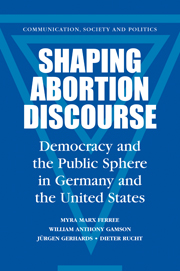Book contents
- Frontmatter
- Contents
- Tables and Figures
- Foreword by Friedhelm Neidhardt
- Preface
- Glossary
- Part I Introduction
- Part II Major Outcomes
- Part III Representing Different Constituencies
- Part IV The Quality of Abortion Discourse
- 10 Normative Criteria for the Public Sphere
- 11 Measuring the Quality of Discourse
- 12 Metatalk
- 13 Lessons for Democracy and the Public Sphere
- Methodological Appendix
- References
- Index
13 - Lessons for Democracy and the Public Sphere
Published online by Cambridge University Press: 15 December 2009
- Frontmatter
- Contents
- Tables and Figures
- Foreword by Friedhelm Neidhardt
- Preface
- Glossary
- Part I Introduction
- Part II Major Outcomes
- Part III Representing Different Constituencies
- Part IV The Quality of Abortion Discourse
- 10 Normative Criteria for the Public Sphere
- 11 Measuring the Quality of Discourse
- 12 Metatalk
- 13 Lessons for Democracy and the Public Sphere
- Methodological Appendix
- References
- Index
Summary
Understanding the complexities of discourse about abortion policy in Germany and the United States has been a challenge. We leave it to the reader to judge how well we have met it. Ultimately, we are interested in using this study of abortion as a tool for addressing a broader set of questions about democracy and the public sphere. These questions focus on the processes by which the practices of newspapers and the activities of groups and individuals, in and out of political institutions, interact to provide a public discourse about policy issues and the quality of the outcome that they produce, evaluated by several competing standards in normative democratic theory. In this concluding chapter, we review what we learned about the dynamics that generate a discourse about abortion and the nature of this discourse in both countries, focusing on the implications for political discourse more generally.
In our model, media discourse on any issue is shaped by more or less organized collective actors of different types who sponsor certain preferred frames. Their resources, connections, skills, and choices about framing strategy influence their standing and the relative prominence of their frames in the media. Organizational and strategic decisions can make a difference in the career of the frame that they sponsor in ways that are reflected in changing its prominence in the mass media forum.
The actors do not contest frames on a neutral or level arena, but on a complicated terrain. The playing field is uneven and littered with obstacles, some of which may impede certain actors more than others, and it changes over time as decisions are reached and policies put in place.
- Type
- Chapter
- Information
- Shaping Abortion DiscourseDemocracy and the Public Sphere in Germany and the United States, pp. 286 - 304Publisher: Cambridge University PressPrint publication year: 2002



